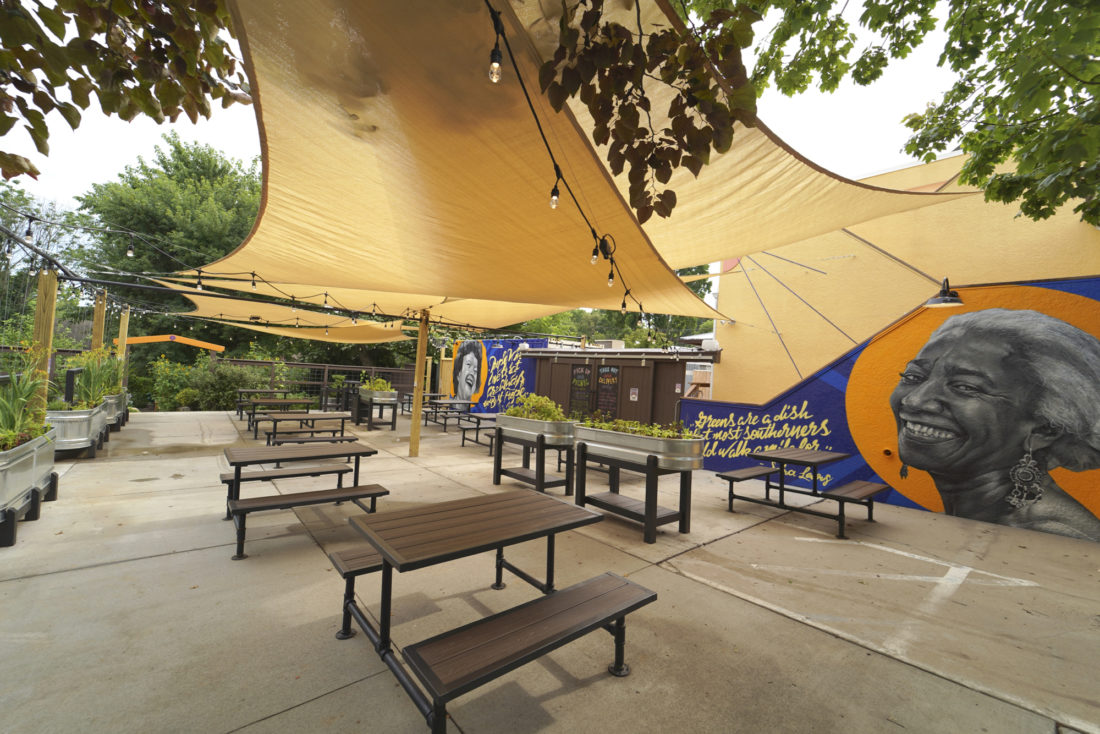The pandemic brought with it many makeshift measures designed to keep people safe while maintaining some sense of normalcy. But one of those temporary solutions, aimed at boosting outdoor dining and merchant space, may be here to stay in Asheville.
During their meeting of Nov. 9, members of Asheville City Council heard an update on the city’s AVL Shares Space program, which permits local business owners to use public and private property to increase their outdoor space for dining, merchandise or programming.
Dana Frankel, Asheville’s downtown development specialist, said that the program, started in June 2020, was originally set to expire Jan. 3. The deadline has since been extended three times, with the latest extension good until Jan. 3, 2022.
City officials, Frankel continued, are now considering leaving aspects of the program in place indefinitely. “We’re going to be working closely with businesses beginning this week to transition to permanency where that’s possible,” she said. “Although I will note that there’s not going to be an immediate path to permanency in all cases.”
According to a presentation shared at the meeting, business owners who applied to AVL Shares Space could expand operations onto public sidewalks and parking spaces, primarily in Asheville’s downtown. The program also loosened minimum parking requirements so that businesses could use their own parking lots for expansion, as well as created temporary curbside pick-up zones in downtown and West Asheville to accommodate increases in takeout sales.
Frankel said that 94 businesses are currently authorized for temporary outdoor expansion; 48 of those are using private property, while 27 are using public sidewalks and 19 on-street parking spaces. Almost all of those spaces, she said, are dedicated to outdoor dining.
The program has been popular among both business owners and members of the public, according to the city’s research. Frankel cited a September survey of participating entrepreneurs finding that 92% said the initiative has had a “very positive” impact on their bottom line. A separate survey of more than 600 people found that 75% reported a “very positive” experience with AVL Shares Space.
Council member Sage Turner asked whether any public space could be dedicated as additional busking space, while Kim Roney suggested that the city revisit an idea to close Wall Street to vehicular traffic altogether.
“This is kind of a slow, methodical, look at the data, do analysis [process] before we move to some level of permanency,” said City Manager Debra Campbell. “This will go maybe 6-9 months, and then we’ll relook to figure out if we have enough information, informed data, in order to direct potentially some policy changes.”
Council sends off Assistant City Manager Cathy Ball
Mayor Esther Manheimer and other Council members gave tearful goodbyes and words of appreciation to outgoing Assistant City Manager Cathy Ball at the end of the Nov. 9 meeting. The city had announced in an Oct. 8 press release that Ball had accepted a position as city manager in Johnson City, Tenn. Her last day on the job is Nov. 10.
“Cathy, you lead with your heart. You care about this community. … I’m going to be sad to see you go,” Manheimer said.
Ball worked for Asheville for 24 years in several roles, including transportation director, public works director and assistant city manager. She also served as interim city manager after then-City Manager Gary Jackson was abruptly fired in March 2018 until Campbell’s hiring in December 2018.
The city’s release noted that Ball was “instrumental” in many city initiatives, such as development of workforce housing at 51 Biltmore Avenue, negotiating a public-private greenway partnership with New Belgium Brewery and utilizing federal funds to provide noncongregate housing for Asheville’s homeless population during the pandemic.
“I’ve learned so much here and would not be the person I am today if it wasn’t for this city and the people that care about it,” Ball said during the meeting. “I absolutely love the employees of the city, and I appreciate the commitment that you show to them.”
Johnson City Mayor Joe Wise said in a Sept. 30 story published in the Johnson City Press that the city is hiring Ball because its leaders want to avoid mistakes Asheville has made regarding growth and gentrification.
“I think one could argue that we hired her because she learned all the things not to do in Asheville, and we’re going to benefit from some of that,” Wise said.





Before you comment
The comments section is here to provide a platform for civil dialogue on the issues we face together as a local community. Xpress is committed to offering this platform for all voices, but when the tone of the discussion gets nasty or strays off topic, we believe many people choose not to participate. Xpress editors are determined to moderate comments to ensure a constructive interchange is maintained. All comments judged not to be in keeping with the spirit of civil discourse will be removed and repeat violators will be banned. See here for our terms of service. Thank you for being part of this effort to promote respectful discussion.